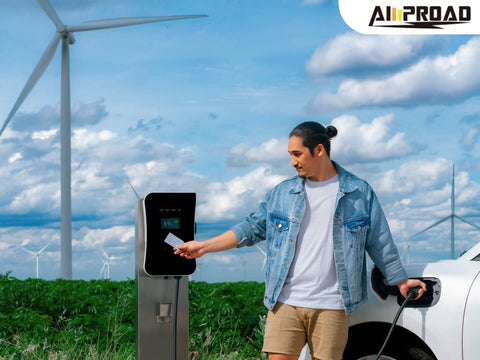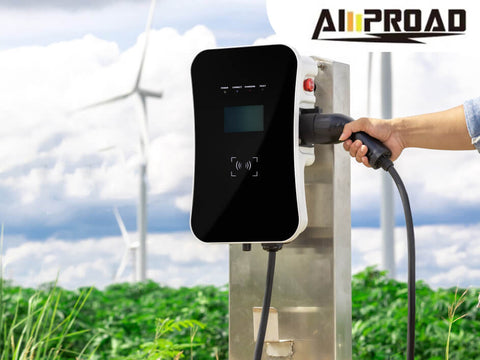
Understanding the costs associated with Level 2 EV chargers is crucial for anyone considering electric vehicle ownership. These chargers provide faster charging than standard Level 1 chargers, making them a popular choice for residential and commercial charging stations. By delving into the factors influencing EV charger costs, individuals can make informed decisions about purchasing and installation, ensuring they select the most suitable option for their needs and budget.
Level 2 EV chargers vary in price depending on several factors, including brand, features, installation requirements, and additional accessories. While some basic models may be more affordable, others with advanced functionalities or higher power outputs may come with a higher price tag. Understanding these variations and considering long-term costs, such as installation expenses and maintenance, can help individuals budget effectively and choose the right Level 2 EV charger for their electric vehicle charging needs.
Factors Affecting Cost
Several factors influence the cost of Level 2 EV chargers, starting with their basic features and functionalities. Basic chargers typically offer standard charging capabilities without additional bells and whistles, making them more budget-friendly options. However, those seeking more advanced features such as smart charging capabilities, Wi-Fi connectivity, or compatibility with mobile apps may expect to pay a higher price. Additionally, the power output of the charger, measured in kilowatts (kW), can impact the cost. Higher kW ratings typically translate to faster charging speeds but may come with a higher price tag.
Brand reputation and quality are significant considerations when evaluating the cost of Level 2 EV chargers. Well-established brands with a proven track record of reliability and durability often command higher prices due to consumer trust and confidence in their products. While lesser-known brands may offer lower-priced options, buyers should carefully weigh the potential risks and benefits to ensure they're getting a reliable and high-quality product. Investing in a reputable brand may ultimately result in greater long-term satisfaction and fewer maintenance issues.
Installation requirements also play a crucial role in determining the overall cost of a Level 2 EV charger. The complexity of the installation process, including factors such as electrical wiring, circuit breaker upgrades, and labor costs, can significantly impact the total expenses. Additionally, installation permits and local building codes may impose additional costs and requirements. It's essential for buyers to factor in these installation expenses when budgeting for a Level 2 EV charger to avoid any surprises and ensure a smooth and compliant installation process.
Average Price Range
The average price range for Level 2 EV chargers can vary widely depending on several factors. Generally, basic Level 2 EV chargers start at around $200 to $400, offering standard charging capabilities without any advanced features. Mid-range options with additional functionalities like smart charging capabilities, Wi-Fi connectivity, or compatibility with mobile apps typically range from $400 to $800. Premium Level 2 EV chargers with high power outputs, advanced features, and durable construction can cost anywhere from $800 to $1,500 or more.
The variations in pricing among Level 2 EV chargers are influenced by several factors. Brand reputation and quality play a significant role, with well-established brands commanding higher prices due to consumer trust and confidence in their products. Additionally, the power output and charging speed of the charger can impact its cost, with higher kW ratings typically resulting in higher prices. Advanced features such as LCD displays, touchscreens, and weatherproofing can also contribute to higher prices.
Buyers should carefully consider their specific needs and budget when selecting a Level 2 EV charger. While lower-priced options may be more affordable upfront, they may lack certain features or durability compared to higher-priced models. Conversely, investing in a premium Level 2 EV charger may result in faster charging speeds, additional functionalities, and greater long-term reliability. By evaluating the features, quality, and pricing of different options, buyers can make an informed decision and choose the Level 2 EV charger that best suits their requirements and budget.
One notable option in the North American market is the Amproad EV charger, priced at $359. Amproad is a reputable brand known for its high-quality charging solutions, offering reliability and durability to users. Despite its competitive pricing, the Amproad EV charger boasts advanced features and a robust build, ensuring efficient and safe charging for electric vehicles. With a focus on customer satisfaction and product excellence, Amproad has established itself as a trusted name in the industry, providing EV owners with a cost-effective yet premium charging solution.
Additional Expenses to Consider
In addition to the upfront cost of a Level 2 EV charger, buyers should consider additional expenses that may arise during installation and maintenance. Installation costs can vary depending on factors such as electrical wiring, circuit breaker upgrades, and labor fees. Hiring a licensed electrician to ensure proper installation and compliance with local building codes is recommended, which may incur additional expenses. Moreover, installation permits may be required in some jurisdictions, adding to the overall installation cost. It's essential for buyers to factor in these expenses when budgeting for Level 2 charging to ensure a smooth and compliant installation process.
Accessories and add-ons can also contribute to the total cost of owning a Level 2 EV charger. Depending on individual preferences and requirements, buyers may choose to invest in accessories such as cable management systems, weatherproof enclosures, or portable mounting options. While these accessories may enhance convenience and usability, they can add to the overall expenses. Additionally, buyers should consider maintenance costs and warranty coverage when evaluating the total cost of ownership. Opting for a charger with a comprehensive warranty and investing in regular maintenance can help minimize unexpected expenses and ensure the longevity of the charging system, providing peace of mind to EV owners.

Comparing Options
When comparing options for Level 2 EV chargers, it's crucial to conduct thorough research on different brands and models available in the market. Buyers should consider factors such as brand reputation, product reviews, and user feedback to gauge the reliability and performance of each charger. Additionally, evaluating the features and specifications of various models can help buyers determine which charger best meets their needs and preferences. Comparing factors such as charging speed, power output, and compatibility with their electric vehicle can aid in making an informed decision.
In addition to researching different brands and models, buyers should also consider the total cost of ownership when selecting a Level 2 EV charger. This includes not only the upfront cost of the charger but also installation expenses, maintenance costs, and any additional accessories or add-ons required. By evaluating the total cost of ownership over the lifetime of the charger, buyers can ensure they are making a cost-effective investment that aligns with their budget and long-term charging needs. Taking the time to compare options and consider all relevant factors can help buyers select the best Level 2 EV charger for their specific requirements.
Tips for Budgeting and Planning
When budgeting for a Level 2 EV charger, it's essential to set a realistic budget that accounts for all associated expenses. Start by researching the average cost of Level 2 EV chargers and identifying the features and specifications that are most important to you. Consider factors such as power output, charging speed, and compatibility with your electric vehicle to ensure you're investing in a charger that meets your needs. Once you have a clear understanding of the cost range for Level 2 EV chargers, set a budget that aligns with your financial situation and long-term charging requirements. Be sure to account for installation costs, permits, and any additional accessories or add-ons you may need.
Exploring financing options can also help make purchasing a Level 2 EV charger more affordable. Many manufacturers and retailers offer financing plans or payment options that allow buyers to spread out the cost of the charger over time. Additionally, some utility companies and government agencies offer incentives or rebates for purchasing and installing Level 2 EV chargers, which can further reduce the overall cost. Be sure to research available financing options and incentives in your area to take advantage of any potential savings opportunities.
Finally, consulting with experts can provide valuable insights and guidance when budgeting for a Level 2 EV charger. Reach out to electricians or EV charging specialists to get estimates for installation costs and advice on selecting the right charger for your specific needs. They can offer recommendations based on your electrical setup, budget, and charging requirements, helping you make an informed decision. By taking the time to carefully budget and plan for your Level 2 EV charger purchase, you can ensure a smooth and cost-effective charging experience for years to come.
Navigating the Cost Landscape of Level 2 EV Chargers
All in all, the cost of a Level 2 EV charger is influenced by various factors, including brand reputation, features, installation requirements, and additional expenses such as accessories and maintenance. Buyers should conduct thorough research and carefully evaluate their options to ensure they choose a charger that meets their needs and budget. Setting a realistic budget, exploring financing options, and consulting with experts can help buyers make informed decisions and maximize the value of their investment in an EV charger.
It's crucial for buyers to consider the total cost of ownership over the lifetime of the charger, including installation, maintenance, and any additional expenses. By budgeting appropriately and planning ahead, buyers can avoid unexpected costs and ensure a smooth and cost-effective charging experience. Whether purchasing a Level 2 EV charger for residential or commercial use, taking the time to understand the factors impacting EV charger costs and making informed decisions can lead to a more satisfying and successful charging solution. Ultimately, thorough research and planning are essential to finding the right EV charger at the right price and enjoying the benefits of electric vehicle ownership for years to come.



